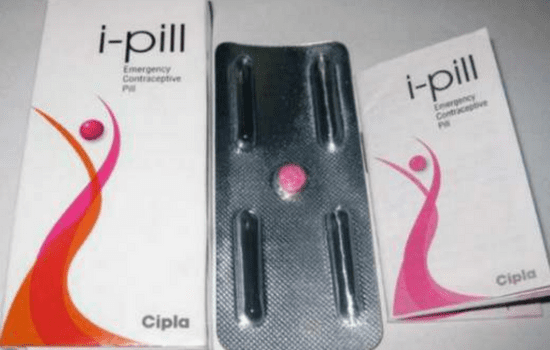In the situation of unprotected intercourse or contraception failure, i-Pill has been used as an emergency contraceptive tablet to prevent unwanted pregnancy. Within 24-72 hours of having unprotected sex, the emergency contraceptive pill should be used. The pill should swallow whole. Also, the sooner you take the tablet, the better because the pill loses effectiveness with time. The majority of these medications should take within 72 hours.
The active component in this pill is levonorgestrel. When the active chemical enters the bloodstream, it inhibits the production of hormones like luteinizing hormone (LH) and follicle-stimulating hormone (FSH) (FSH). These hormones are in charge of egg formation and release from the ovaries (ovulation). As a result, depending on your reproductive cycle, the emergency pill works by delaying the ovulation process. If the ovary has already released the egg, the pill works by interfering with the fertilization of the egg with the sperm. If fertilization has already taken place, it prevents pregnancy by interfering with the implantation (attachment) process in the uterus.
However, most women should aware that the morning-after pill is not a primary means of pregnancy control and should only use in an emergency. Furthermore, it should not be mistaken for abortion tablets. It is generally safe if used responsibly, but it might cause nausea, exhaustion, and stomach cramps.
Side effects of I-Pill

- Breakthrough bleeding, often known as spots, has a typical adverse effect on contraceptive tablets. It is the term used to describe vaginal bleeding that occurs between menstrual periods.
- When taking the tablet for the first time, you may experience mild nausea, which usually passes quickly.
- Hormones present in birth i-pill have been shown to cause or worsen headaches and migraines.
- Taking birth control pills may result in irregular or no periods for a while.
- You may also suffer fatigue, changes in vaginal discharge, and a decrease in libido.
- An increased chance of blood clots is a major concern of using birth control pills, particularly combo tablets.
- pulmonary embolism deep vein thrombosis cardiac attack stroke
- In general, the risk of a blood clot from any type of birth control pill is minimal.
- They do not provide protection against sexually transmitted illnesses (STIs). To avoid STI transmission, you or your partner(s) will need to use condoms.
- You must take a tablet each day. If you miss a pill or take it outside of the 3- or 12-hour window (depending on the pill), your chances of becoming pregnant rise.
- You must ensure that you have a new pack available to go. Delaying the start of a new pack will also enhance your chances of becoming pregnant.
According to the American College of Obstetricians and Gynecologists, roughly ten persons out of every 10,000 who use birth control pills will develop a blood clot after a year of using a combination pill. This risk remains lower than the risk of getting a blood clot during pregnancy and directly afterward childbirth.
However, certain populations are more likely to develop a blood clot as a result of the drug. This includes those who dwell in larger bodies, have high blood pressure, and spend long periods of time in bed.
Also Read:- Food and drinks that you avoid during pregnancy
Pros of I-pill
- When taken as recommended, it is 99% successful.
- It is a simple and safe approach to contraception.
- It enables sexual spontaneity (no need to plan prior to the event.
- It may result in lighter periods.
- It can relieve the discomfort of menstrual cramps.
- Combination tablets can use to alter the timing and frequency of your period or to skip it entirely.
How does the i-pill tablet function?

- For instance, they keep your body from ovulating. This means your ovaries won’t generate an egg every month.
- Second, these pills stimulate your body to thicken your cervical mucus, which is the fluid around your cervix that allows sperm to go to your uterus and fertilize an egg. The thicker mucus keeps sperm from entering the uterus.
- I-pill function in a variety of ways. They mostly operate by thickening cervical mucus and weakening the endometrium.
- The endometrium is the uterine lining where an egg implants after it has fertilized. If this lining becomes thinner, it becomes more difficult for an egg to implant, preventing pregnancy from developing.
Choosing a Birth Control Pill type as per body requirements
Not every drug is appropriate for every individual. Consult your doctor to find the best pill option for you. The following considerations may significantly affect your decision:
- Describe your menstrual symptoms- If you have heavy bleeding, a progestin-only birth control pill may be preferable to a combination tablet.
- If you are breastfeeding- If you’re breastfeeding, your doctor may advise you to avoid estrogen-containing birth control tablets.
- Your cardiovascular system- Your doctor may offer a progestin-only birth control pill if you have a history of stroke, blood clots, or deep vein thrombosis.
- You may also have other chronic health concerns- You may not be a good person for oral contraceptives if you have chronic health concerns such as active breast or endometrial cancer, migraine with aura, or heart disease. Consult your doctor and provide your complete medical history.
Frequently Asked Questions
We have mentioned all the information above but there is a possibility that people may have some confusion so here are some FAQs that people used to ask on daily basis keeping in consideration of the above information we have answered all the relevant queries.
How many times in a month can I take an i-pill?
Preferably not even once i-pill is for emergencies only emergency means sexual assault tone condoms etc, to avoid side effects of a large dose of hormones please plan for birth control in advance and use regular birth control pills or condoms.
Doctors do not recommend frequent use of such pills because of the side effects these may cause to your body like irregular menstrual cycle heavy bleeding etc.
After sex how much time should i-pill be taken?
It works best when taken within 24 hours, taking the i-pill within 24 hours of unprotected sex can reduce the risk of pregnancy by 95 percent up to 72 hours after unprotected sex i-pill can reduce the risk for pregnancy by 87 percent you can take it up to 5 days after intercourse but it may or may not work.
Can i-pill be taken on an empty stomach?
yes, it has considered safe to take the i-pill on an empty stomach however consuming it after eating food can prevent nausea and other side effects the presence or absence of food in the stomach has no relation with the i-pill absorption.
Also Read:- What does Family Doctor Do?
What is the number of doses of i-pill should a person take?
I-pill comes packaged as a strip with a single tablet one i-pill tablet constitutes 1.5 milligrams of levonorgestrel hormone which is used for emergency contraception hence one tablet is taken within the stipulated time preferably within 24 hours and up to 72 hours is sufficient to stop unwanted pregnancy.
How do I know if the i-pill is working?
If you get your periods on time or after a week’s delay it is a good sign that the emergency contraceptive pill has worked you can also take a pregnancy test in 2 weeks.
Is one i-pill enough for an emergency?
yes, one pill is more than enough take it as quickly as possible after intercourse the earlier you take it the safer you are safe from pregnancy using the i-pill is time-dependent that how quickly you take the pill taking extra pills two days late will not give you extra protection but may give you extra side effects please note that this can help you avoid conceiving that is stop you from getting pregnant but if you are already pregnant it cannot abort an existing pregnancy.
Also read: The Secret Behind Sex Positivity
Conclusion
Birth control tablets are oral contraceptives that aid in pregnancy prevention. Each pill contains trace levels of estrogen and/or progesterone (in its synthetic form, called progestin). They have a 91 percent success rate when taken correctly.
Birth control pills are classified into two types: combination and progestin-only. Combination pills are more frequent, but progestin-only tablets, which do not contain estrogen, may be a better fit for some people, such as those with a history of blood clots or who have heavy periods.
Before beginning to use birth control pills, consult with your doctor or a registered medical practitioner to identify the best type for you.





